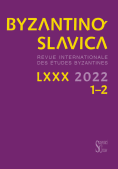Die philosophisch-dialektische Arbeitsweise und das theologische Selbstverständnis des Niketas von Byzanz
The philosophical-dialectical
Working methods and the theological Self-perception of Nicetas of Byzantium
The Programma, the Apologia and the 'method part' in his Islampolemik "Refutation of the Koran" (Ἀνατροπὴ τοῦ Κορανίου)
Author(s): Manolis UlbrichtSubject(s): History, Middle Ages, Theology and Religion, 6th to 12th Centuries, History of Islam, Qur’anic studies
Published by: AV ČR - Akademie věd České republiky - Slovanský ústav and Euroslavica
Keywords: Nicetas ;Byzantium ;Islam ;9th century ;Islamic work ;methodological passages ;Palaiologan era ;argumentative context
Summary/Abstract: The article explores the argumentative context of the anti-Islamic work by Nicetas of Byzantium (9th century) titled Refutation of the Qur’an (Ἀνατροπὴ τοῦ Κορανίου). The study is based on three core passages of his work: Through a philological examination of the work’s foreword, the symbiosis of secular and ecclesiastical power expressed in the so-called Programma is examined. Then, the Apology of the Christian faith is unfolded in its main lines of philosophical argumentation presenting Nicetas’ train of thought from the “power of God” to the “Trinity of the Godhead”. Finally, the polemic’s Methodological Passages are examined, in which Nicetas sets out the foundations of his subsequent argumentation against Islam. The opus magnum of Nicetas of Byzantium is one of the most influential within Byzantine polemics against Islam until the Palaiologan Era. The present study is intended to contribute to a closer examination of his oeuvre and to place it in the historicaltheological context of his time.
Journal: Byzantinoslavica - Revue internationale des Etudes Byzantines
- Issue Year: LXXX/2022
- Issue No: 1-2
- Page Range: 30-58
- Page Count: 29
- Language: German
- Content File-PDF

